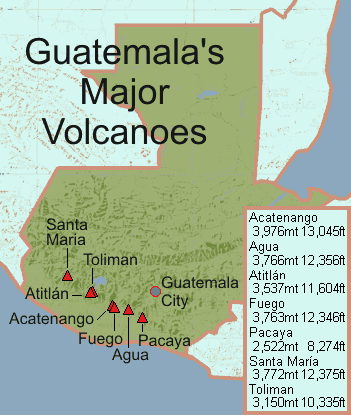Volcanoes & Tropical Storms Don't Mix
Posted by JAC on 5/29/2010, 5:50 pm
 Dark ash covers an American Airline 737 on the tarmac at the airport in Guatemala City. http://www.youtube.com/watch?v=fFoF57KX2yU http://www.wral.com/news/national_world/national/story/7692451/    An eruption of Pacaya in 1976 Pacific storm Agatha's rains kill four in Guatemala (Reuters) - Guatemala declared a state of emergency on Saturday as heavy rain from Tropical Storm Agatha lashed the Central American nation, killing at least four people and forcing hundreds from their homes. Two adults and two children were killed when their home was buried in a mudslide in Alomolonga, 120 miles west of the capital, emergency officials reported. "This (storm) is serious ... The worst will come around 9 am (on Sunday) and we are extending the state of emergency to the entire country," President Alvaro Colom told a news conference, adding that the government was evacuating many families from at-risk areas. Emergency workers reported rivers were already swollen by heavy rain and warned flooding could be worse than usual due to ash from the erupting Pacaya volcano south of the capital that has blocked drainage systems. The eruption, which began on Thursday, heightened concerns about Guatemala's coffee crop, Central America's largest, which is prized for its quality. LANDFALL ON SUNDAY Agatha, the first named storm of the 2010 Pacific hurricane season, was about 105 miles west of San Jose off Guatemala's west coast at 3 p.m. local time (2100 GMT), with maximum sustained winds of 45 miles per hour, the U.S. National Hurricane Center reported. The storm was moving northeastward toward the Guatemalan coast at 7 mph and could grow slightly stronger before making landfall late on Saturday night or early Sunday morning, the Miami-based hurricane center said. It said the storm would dump up to 20 inches of rain over southeastern Mexico, Guatemala and El Salvador, and possibly as much as 30 inches in some areas, which could trigger flash floods and mudslides. Heavy coastal flooding was also forecast around the area where the storm makes landfall. Authorities in El Salvador said they would likely soon raise their alert level and preventive evacuations of people in high-risk areas had begun. Tropical storm warnings were posted for the Pacific coast from Boca de Pijijiapan in southern Mexico to the El Salvador-Honduras border. Civil defense officials in the southeastern Mexican state of Chiapas reported rivers swelling and said they were preparing to shelter people who may need to leave their homes. Some 2,000 people in Guatemala have already been evacuated due to the eruption of Pacaya, located 25 miles south of Guatemala City. At least one death has been blamed on the eruption and the country's main international airport has been shut by ash until at least early next week. The volcano remained active but the intensity of its activity seemed to be less, civil defense officials said. Pacaya has been active since the 1960s but had not ejected rocks and ash since 1998. The volcano is close to some of Guatemala's most prized coffee plantations. The national coffee association, Anacafe, had no immediate reports of serious damage to crops. Coffee workers said on Friday rain from the storm was helping to clean ash off trees and were optimistic crop damage would be minimal. Nancy Mendez, a spokeswoman for Anacafe, said poor communications were hampering the agency's efforts to collect information on the state of the crop. (Additional reporting by Nelson Renteria in San Salvador; Writing by Robert Campbell; Editing by Alan Elsner) |
105
In this thread:
Volcanoes & Tropical Storms Don't Mix - JAC, 5/29/2010, 5:50 pm
- AGATHA DISSIPATES OVER THE MOUNTAINS OF WESTERN GUATEMALA - JAC, 5/30/2010, 9:21 am
- Pacific storm Agatha slams into Guatemala, 13 dead - JAC, 5/30/2010, 9:26 am
< Return to the front page of the: message board | monthly archive this page is in
Post A Reply
This thread has been archived and can no longer receive replies.